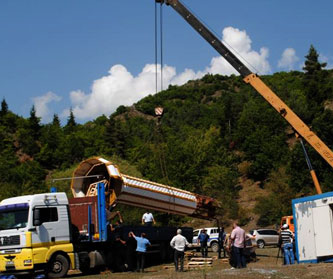
TBILISI, DFWatch–The conflict over a minaret that was dismantled in a small Georgian village is far from over. Locals are continuing their fight to have the minaret restored, and claim that the guarantee of freedom of religion in the Georgian Constitution supports them.
In Chela, in southern Georgia, a minaret was dismantled by the government at the end of summer. This led to a conflict with Muslim and Christians breaking off contact after having lived in friendship for decades.
The Chela mosque
Mamuka Vashakmadze, Mufti of Samtskhe-Javakheti, says there are 3 000 Muslim families in the region, and ten functioning mosques, but none of them has status as mosque. Officially, they are just houses, including the mosque in Chela.Vashakmadze says they have been harassed a number of times. The electricity was cut at several mosques; some of the non-functioning mosques are used as stables or storehouses. Some are being destroyed because of lack of care. They asked to get back management rights over these mosques, but the government refused.
Jambul Abuladze, Imam of the Chela mosque, recalls that in 2006, when there was no mosque in the village, a man called Davit Chogadze was building a new house for himself, as he was living with his brother and wanted to have his own place. He constructed the first floor of the house, when his brother moved to the next village and construction of the new house stopped.

Local Muslims purchased the land of his new house and paid for the construction work that he had already carried out. Construction of the village ended in 2008 with the help of local volunteers. But in 2008, when the construction was almost finished, a priest from the church in nearby Zarzma gathered a group of 150 people and attempted to destroy the mosque, but their attempt failed.
Davit Chogadze, a Muslim living in Chela, recalls that the relationship between locals in Chela used to be an example for the whole region. They went in each other’s weddings and funerals and lived in peace and friendship. He says that the priest of Zarzma Nikoloz Getsadze opposed the Chela mosque about four times, claiming that it would cause noise.
“The mosque has been here for years and we have never conducted loud prayer or summoning for prayer,” he says. “We have never done it because we didn’t want to violate the rights of local Christians here.”
Muslims explain that they wanted to have a minaret because it is an integral part of the mosque and people will know that it is a mosque when they see the minaret. They didn’t plan to use the minaret’s function as a way to call people to morning prayer.
“We had microphone and loudspeakers, but we never used them.”
Plans for a minaret
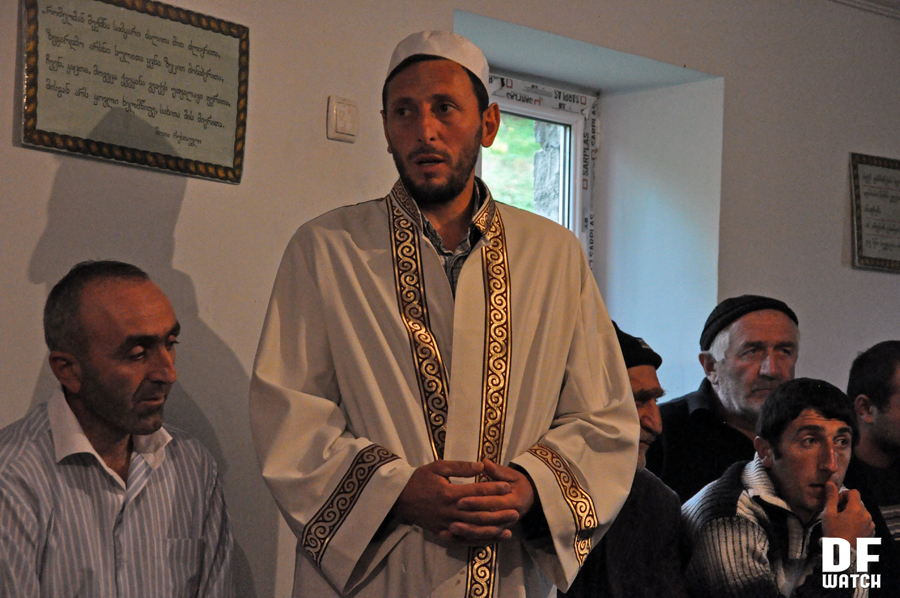
Mufti Vashakmadze recalls that a year ago, when he was appointed, he learned that local Muslims for several years had wanted to install a minaret and had even collected money to finance it with.
“They wanted to have a real mosque with a minaret,” he said, continuing that he was studying in Turkey and knew companies which were working on minarets. He contacted one of the companies and asked an engineer to come to Chela and inspect the place and the mosque.
The hole was ready for a minaret and when the engineer came, he took measurements and calculated how much the construction of a minaret would cost: USD 9 000. This company had a license making minarets in Turkey and Europe. Locals in Chela didn’t have money, but offered a USD 500 guarantee which they would pay when the minaret was finished.
A few months later, some time in 2013, the company said that the minaret has been shipped and was in Sarpi on the border Turkish-Georgian, going through customs procedures.
A group of four Muslims went there and one of them, Jambul Abuladze, registered as the one responsible. This was Sunday July 14, 2013.
“We came with the documents. They indicated which cabin we should go to. We were not experienced with this process and didn’t know what to do, but listened to what they told us,” the mufti continues.
They paid 400 lari for services and 3 175 lari in total for all customs proceedings. They waited for the documents to be completed.
“Customs clearance finished without any problem, and at about 14:00 on July 14, we moved to Adigeni and arrived in Chela at 12:00 at night.”
The foundation of the minaret was ready. Concrete was prepared for July 15 in the morning. The first part of the minaret was in concrete. 50 people worked on it. For 48 hours, the work was stopped as the concrete had to dry. It was 15 meters high. For all this time there was no problem. No-one protested.
Then a crane came on July 18 and finished the installation of the minaret, still without complaints or protests.
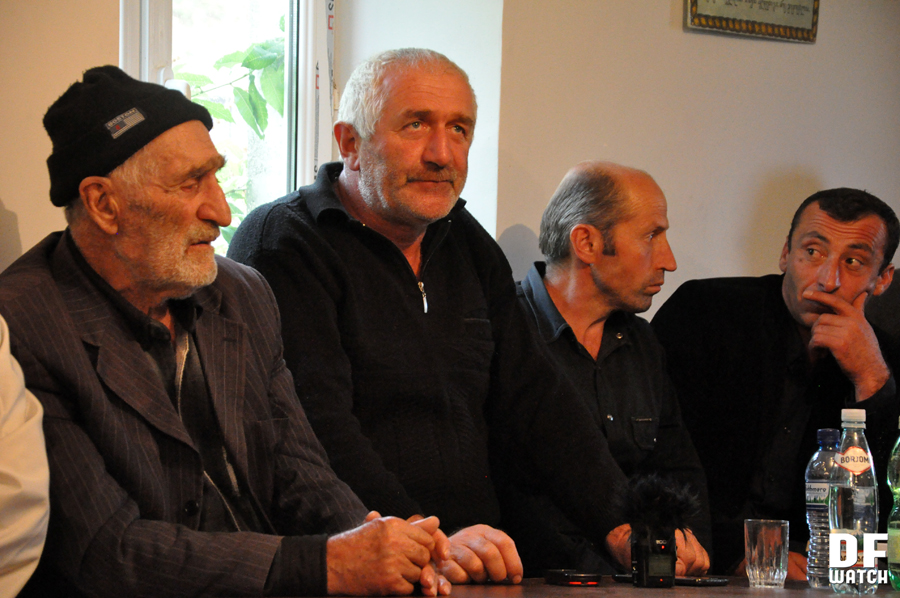
The Muslims paid money for the minaret and the installation finished.
Then again a priest from Zarzma along with other clerics started collecting signatures demanding to dismantle the minaret, claiming that it would cause too much noise and disturb the local Orthodox Christian families.
“The local school director Giorgi Chikhradze supported him, a person who should teach children tolerance,” Davit Chogadze says.
“Until those signatures, the minaret had been transported such a long way, was installed for so many days and no-one expressed any interest in it. The wave of protest started with those signatures,” he continued. “There is no contact between us now. Children keep asking how they should treat children of Orthodox families now.”
The local government sent a warning to the Muslims that they lacked some documents and gave them a 30 day deadline. Then the Revenue Service appeared, demanding to check the goods which was transported across the border from Turkey.
Before the 30 day deadline, the minaret was dismantled.
Dismantling and confrontation
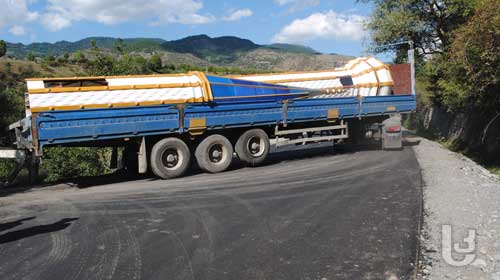
Otar Markoidze is a chairman of the six-member commission which governs Chela’s Mosque. He remembers August 26 when the operation of dismantling was conducted by the Ministry of Interior. He said he was home when he learned by phone that something was happening at the mosque. He also noticed helicopters flying around the place, but he didn’t pay attention until the call.
When he came to the mosque, a bridge 500 meters away from it was blocked by the police. A crane was standing at the mosque and in the process of dismantling the minaret. Journalists and others were not allowed to approach. No-one answered their questions about what was happening.
“A man dressed in civilian clothes told me ironically that we would learn what was happening when it was necessary,” he recalls.
Markoidze says there were special unit employees on the bridge and the property with the mosque on was full of policemen, all dressed in blue, while higher officials of the police were probably dressed in civilian clothes.
The Muslims tried to cross the bridge, but in vain. They were unarmed.
Markoidze claims that police tried to provoke them by shouting at them.
“Adjarians, you Tatar, your time has come to the end, they told us,” he continued. Some of them recorded what was happening on their phones, but the police deleted their files.
During the shouting, some of the Muslims were beaten, some detained and handcuffed.
“We weren’t even chained, but tied as calves. Even I, a 63 year old man, teacher, was beaten. I was beaten with batons. I fell down with my hands tied, lost my hat and glasses,” Markoidze says. He remembers being forced into a car, a police pick-up truck, with five other Muslims, and taken to the police department in Akhaltsikhe.
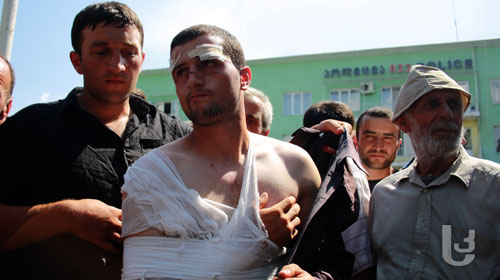
He remembers being all dirty with torn trousers.
“Then there was a festival of scolding and swearing at the department, especially from the chairman of the department, Gela Kokhodze, who was scolding each and every one.”
He said that even though they were dirty, they were allowed to sit on clean and comfortable chairs in a room with a TV. There was a special news bulletin about the events in Chela. The detainees watched it with the policemen who continued swearing and cursing the journalists who had made the report.
21 people were detained. Three of them are charged under the Criminal Code. Vakhtang Markoidze is one of them. He was released on 2 000 lari bail.
“I don’t know why, as we did nothing different than the rest of the 21 detainees.”
The Muslims in Chela assume that those who were more beaten were let go, while those who had less injuries received more serious charges.
“I wasn’t let out from the police department until they had cleaned me up and put clothes on me, as too many people were gathered outside.”
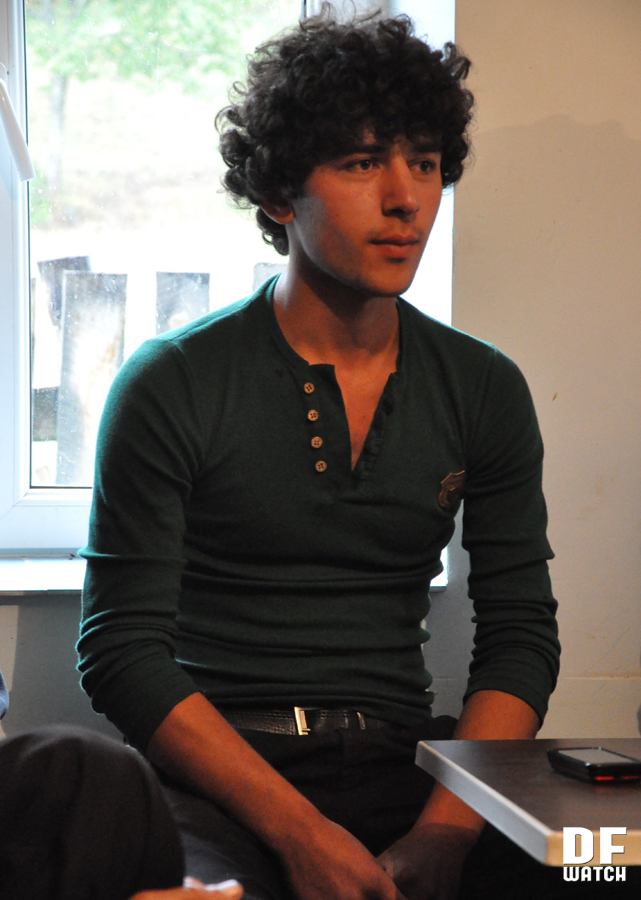
Raindi Shantadze, 18, also received criminal law charges. He remembers that they didn’t resist the police but asked what was happening and tried to protect the mosque.
“After attempts by police started physical and verbal abuse. I was detained and brought by pick-up truck to the police department. I was beaten in the car, where four policemen were sitting with us,” he says, adding that Gela Kokhodze personally insulted him, and remembers that he was called a Tatar.
“They told me that I should be baptized and I didn’t have to be a Muslim.”
Genadi Abashidze, 25, was at the bridge when the minaret was finally dismantled. He said it caused concern among people on the other side of bridge, when there broke out verbal abuse between them and police, which turned into beating.
“I was unconscious. In this condition I was tied with handcuffs which hurt my hands. We begged to losen them or change thenm with chains, but in vain.”
At the police department, he was told that ‘Georgian Muslim doesn’t exist.’
“When I arrived at the investigator with my lawyer he told me that Georgians must only be Orthodox.”
A few weeks ago, the three appeared in court. The defense and the prosecution agreed to stop the criminal prosecution, which means that charges will be dropped. Instead, they might be sentenced to different kind of punishment, like community service, according to Samkhretis Karibche, a local newspaper which reported from the court hearing.
The Prosecutor’s Office will withdraw its case, while the three will be sentenced to 40 hours of community service and will be given back the bail money of 2 000 lari each.
Adigeni gamgebeli detained
The day after the dismantling of the minaret, police detained Simon Parunashvili, the gamgebeli of Adigeni. Parunashvili, who is member of the National Movement, was charged with exceeding his powers and negligence.
However, he and local municipality members think his detention was related to the Chela events.
Parunashvili remembers that he remained with Muslims during the day the minaret was dismantled. He was standing in front of the police department that night. At six in the morning he went home to take a shower and change. When he went to the office, he was detained.
He says that the two charges are without basis and the court will most likely acquit him.
“I was gamgebeli, and my duty was to stand with my people. There were detained and I was supporting them,” he said.
Parunashvili believes he was detained for two reasons: First, almost in every region of Georgia, gamgebelis have been changed after the change of government a year ago. He was one of the last who remained from the previous government. The second reason, was his presence during the minaret incident.
“I think government structures intervened here and they didn’t forgive me for being with those people. I issued an order to dismantle the minaret, but within the frames of law. I was upholding the law,” he added.
Revenue Service and local government
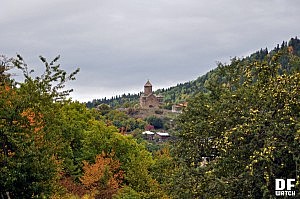
Later, on August 26, the Revenue Service issued a statement which said that the minaret was dismantled in order to carry out a commodity examination.
The statement says that entrepreneur Jambul Abuladze purchased steel building parts in Turkey on July 14 and brought them to Georgia in order to construct a minaret. After studying the customs declaration and import documents, the Revenue Service concluded that there is ‘reasonable doubt that goods might have been incorrectly classified in the documentation, which may have caused reduced import taxes.’
“It is impossible to define the amount of reduced taxes without physically examining the goods and without appropriate examination,” the statement reads, adding that Jambul Abuladze was notified about this on August 21.
“Since the weight of the minaret construction and commodity code may not correspondent to the declared data, the Revenue Service decided to start demolishing it on August 26,” the statement read.
Simultaneously, the local government in Adigeni was also studying the minaret issue and decided to fine the Muslims 200 lari (USD 120) for illegal construction.
The acting gamgebeli, or head of the local government, says that there has been no conflict between Orthodox Christians and Muslims there before.
He says that August 23, the local government issued a document about the decision to dismantle the minaret. This happened after a letter from the local police which contained a list with signatures of local Christians and clerics. The police had started studying the case and concluded that the minaret was illegally installed.
Zaza Zimzibadze, a lawyer at Adigeni municipality, explained that the police document contained about a thousand signatures and stated that after inspection they found that the minaret was illegal.
They issued a warning to the owner, and asked him to produce a document showing he had permission, to turn the illegal construction into a legal one.
“They didn’t follow our instructions,” he said, adding that August 5, they gave instruction to gain permission and after ten days, August 19, surveillance protocol was prepared that they had not followed the instructions of the municipality. They decided to fine the Muslims and dismantle the minaret. August 20, an order was issued about fining and dismantling, but Muslims were given three days to dismantle it themselves.
Three days passed, but the minaret wasn’t dismantled. August 24, they made a decision to dismantle the minaret, but it was up to the National Enforcement Bureau to enforced it. Since it was a Friday, the enforcement bureau would be informed by the municipality the following Monday.
On Monday, the Revenue Service dismantled the minaret with the help of the Interior Ministry.
Building permission and legal basis
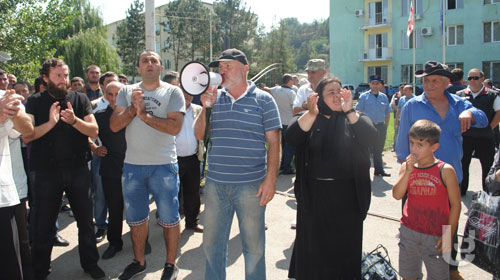
Mufti Mamuka Vashakmadze remembers that when the minaret was brought to Georgia, he appealed to Jemal Paksadze, the central Mufti of Georgia, to request documentation and get permission, but he told them that Georgia doesn’t have a law to regulate the installation of minarets and he couldn’t get such a permission.
“That’s why we didn’t appeal to local government, because there was no law for it. We thought there was no point in it.”
But the law also didn’t regulate locating mosques in the country and that’s why every mosque was registered as a house.
“The Mufti told me that as we had built a mosque as a house, we could install a minaret as a construction, and we did.”
Muslims point out that the central Ortajame Mosque in Batumi, which only a couple of months ago was registered as a mosque after legislative amendments, has had a minaret for many years and there has been no problems with it.
THe Chela Muslims say that if they had known what kind of a scandal it lead to, they wouldn’t have installed the minaret, even though they think what happened is a violation of their rights, but they think it isn’t worth losing good neighbors and friends.
Giorgi Gotsiridze, a lawyer from the Georgia’s Young Lawyer’s Association, explains that a permission from the local government is required for any kind of construction. He also explains that the reason for dismantling the minaret in Chela was to define the weight of the goods which were taken across the border.
“But they didn’t have this right and no law gives the Revenue Service the right to dismantle,” he says, adding that the Revenue Service justified it by saying that taxes hadn’t been fully paid; however, the customs service let the goods pass.
“It was imported from Turkey. We have a free trade agreement with Turkey and we shouldn’t pay anything at all for imported goods from Turkey, only VAT, but the government claims that they should have paid more, which means that they apply the law incorrectly,” he explains.
Possible reasons for the conflict
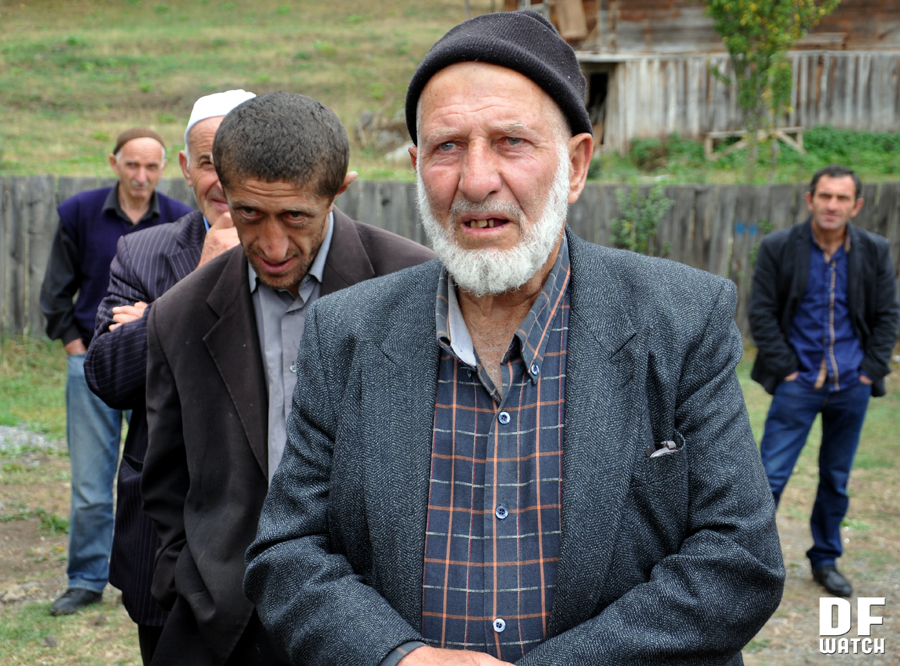
All the parties have their own opinion about who is responsible for the conflict. Some think this might have been the National Movement, the party led by Mikheil Saakashvili, exploiting tensions for its own PR. Others think it might be the government, and some think the Orthodox Church is behind it.
Givi Endeladze, head of the City Council in Adigeni and a member of the UNM, says the local government knew nothing before the minaret was installed.
“That’s why I think UNM has no hand in this,” he says, adding that some people want to turn politicize the issue. He also thinks the reason for the conflict is that a minaret was built in a region where there has never been minarets.
“They had a place to pray where they prayed and no-one interrupted,” the acting gamgebeli says. “I don’t know what caused it, why people went against them when the minaret was installed.”
Davit Chogadze, a Muslim from Chela, recalls that Muslims helped the Christian population with building a church, both by taking part in the work and by giving wood materials.
“We think people with belief won’t do anything wrong no matter what religion they have. Our neighbors didn’t complain at first when we installed it, but some of them signed that agreement demanding to dismantle it.”
Jambul Abuladze says that the Georgian Constitution guarantees freedom of religion.
“That’s why we think we didn’t violate the law and if there was any violation they could fine us,” he continues. “But here is another thing: Georgia is a theocratic country. The government cannot make a decision. There is a constitution, but the the Patriarchate has the final word in this country.”
He became convinced of the priveleged position of the Georgian Orthodox Church when main Mufti Jemal Paksadze was summoned to the Patriarchate instead of government bodies in order to sign an agreement that minaret would return back to Chela but would be sealed, unless the country comes up with new legislation.
“If the Patriarchate gives such orders, it is natural that it will continue so. The decision was made by the Patriarchate not by the state.”
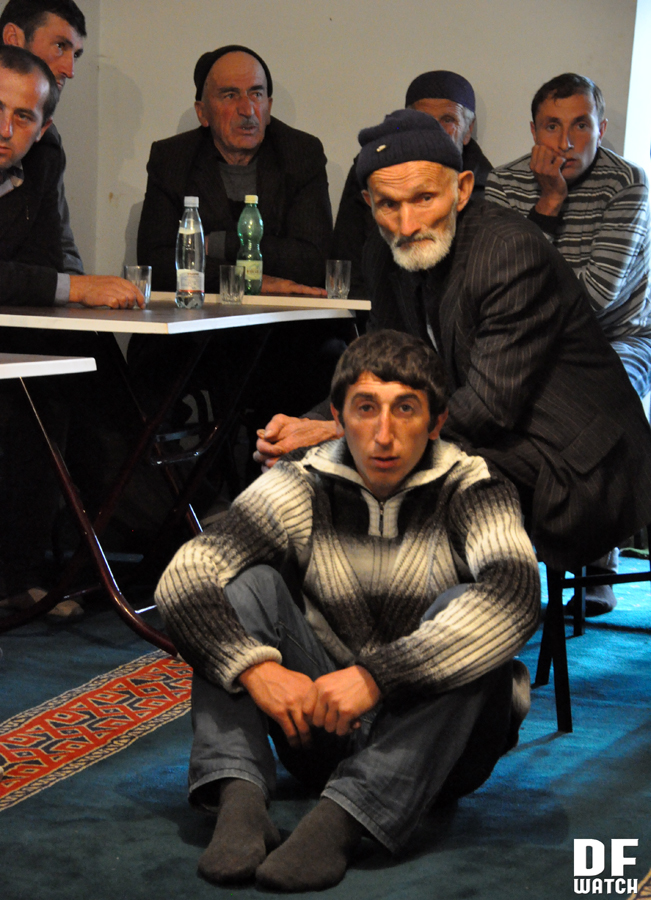
They don’t think the UNM has anything to do with it. They think it is a result of the government fulfilling the orders of the Patriarchate.
“When we were rallying in Batumi demanding to restore the minaret, the Patriarchate decided to seal the minaret, summoning Jemal Paksadze to sign this document. Afterwards, the priest in Zarzma stated that he is a guarantee that the minaret won’t be installed in Chela ever.”
Beka Mindiashvili, an expert working on minority issues, says the actions in Chela was abuse of religious feelings and a rude violation of human rights caused by the inadequate interference from the government.
He says the local government made a decision to dismantle the minaret but the Revenue Service did it instead, although having no right to do it.
He thinks that the problem comes from the groups of Orthodox Church and specifically from the monastery of Zarzma.
Mindiashvili thinks the government didn’t do enough to prevent religious conflicts. He said that before the parliamentary election, the opposition was using islamphobic rhetoric during the campaign and when they won, xenophobes were given a green light and they thought they could do everything.
“It has begun in Nigvziani, than continued in Samtatskharo, Tsintskharo and then in Chela,” he says. “It is the result of local governments and law enforcement not responding to the problem adequately. If the government had made some repressive steps to solve the problem in Nigvziani, the process would have stopped.”
Mindiashvili believes the government has the resources to respond to such violations, and if the government does not respond, it causes more complications.
“I think there still exist some priorities toward most authoritative and authoritarian Orthodox Church, that is not lead by the values of Christianity, but acts like an organization for xenophobes that seeks to achieve a right to religious discrimination.”
He explains that the problem is caused by political and religious authorities, not by people who are neighbors in Chela, where Muslims and orthodox live together.
Archimandrite Nikoloz from Zarzma says that for 60 years, Muslims and Orthodox have been living in peace in Chela. He thinks it was incorrect to install a minaret without asking the Christians, who are minority in that village.
He says that the local population is against installing a minaret and thus he is against it too.
“If they were planning anything they should have applied to the Patriarchate, to people, government bodies, and then install it,” he says, adding that when Orthodox Christians build churches they don’t need to ask for permission in Georgia, but mosques and minarets is another issue.
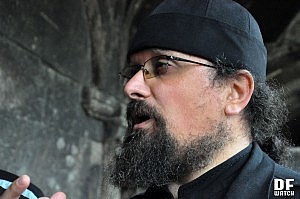
Nikoloz says no-one has prohibited Muslims in Chela from praying.
Roin Taktakishvili, who is an Orthodox and one of the organizers of the rally against the minaret, says that he and his group didn’t start the provocation, but some other provocative group did it, in order to create a conflict between neighbors.
“It is a provocation installing a minaret in one night when no-one knew anything about it,” he says.
Taktakishvil believes that the minaret is not part of the mosque but it is a castle which Muslims use to loudly summon each other for prayer.
Another woman, from a group of Orthodox villagers against the minaret, says that even in Islamic countries many mosques do not have a minaret.
“Our rights are violated, Christians,” she says, but adds that if the Patriarchate decides to permit installing a minaret they will obey it.
Some of the Orthodox from the same radical group claim that the minaret doesn’t fit into Georgia’s architecture and the do not prohibit anyone to pray, only protect the position of Orthodox people.
“Muslims live here, but they are guests and their religion is a guest too. Let them live by the rules which are established here and not summon loudly to come and pray at the mosque and not disturb the local population.”
The way forward
Almost everyone, including the local municipality of Adigeni and the group of Orthodox Christians, agree that the most correct way to solve the issue is to introduce new legislation, while the Muslims think everything will be fine if the government applies the Constitution as a guide instead of the Georgian Church.
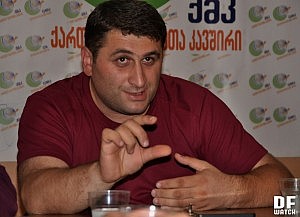
Tariel Nakaidze, chairman of the Union of All Muslims of Georgia, thinks that if permission is not given to erect a minaret, this is a sign that there is a serious democracy problem in Georgia.
“Fortunately, we Georgian Muslims managed to calm everyone down and transform the problem into a dialogue,” he said. He blames the government for what happened.
Currently, the minaret remains sealed nearby Chela as result of an agreement between Muslims and the Patriarchate, which according to a GYLA lawyer, doesn’t have any legal force.
Muslims plan to continue their fight and attract the attention of the international community.
They have been told that the government promises that the minaret will be restored but now there is process to get the documents in order. No-one is aware of when this will happen and no-one knows if the minaret will ever be put back up.
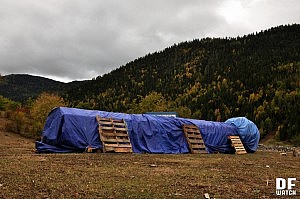
Two weeks ago, Muslims appealed to the Adigeni Municipality asking to restore the minaret. Jemal Paksadze, Mufti for all of Georgia, delivered the letter, Samkhretis Karibche reports.
“I respect Catholicos Patriarch, priests and I hope there won’t be any confrontation,” they quote Paksadze. “When it comes to the minaret, if it will be restored, there won’t be any loud chanting from it. Christians and Muslims have agreed on that. We want peace as it used to be in the past.”
According to data from the local municipality, there are 55 villages in Adigeni. In 20 of them, there is a partly Muslim population, and in 12 of them the Muslims are in majority. The population of Adigeni is 22 047, and about 3 000 of them are Muslim.

